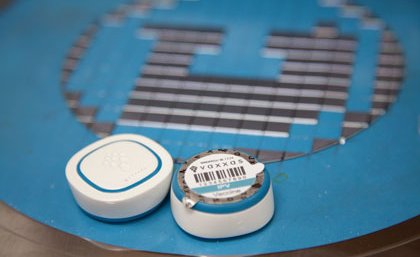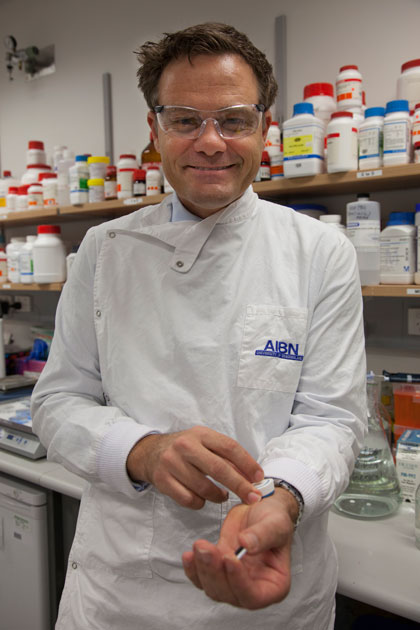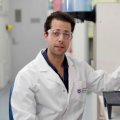
Vaccine technology company Vaxxas has moved a step closer to achieving its goal of improving world health, thanks to a capital raising of $25 million.
The company, a start-up of The University of Queensland’s UniQuest commercialisation company, has attracted the funding led by Australian venture capital firm OneVentures in its series B fundraising to further the Nanopatch.
The Nanopatch, invented at UQ’s Australian Institute for Bioengineering and Nanotechnology by Professor Mark Kendall, seeks to replace traditional needle and syringe methods with a small patch that delivers vaccines painlessly.
In 2011, UniQuest, working with Professor Kendall, founded Vaxxas to advance the Nanopatch towards being a clinically-proven product.
“This investment is a key next step in advancing a series of clinical programs and develop a pipeline of new vaccine products for major diseases using Vaxxas’ patented Nanopatch technology,” Professor Kendall said.
“The Nanopatch has the potential to improve global health.
“The technology is the size of a postage stamp, and has thousands of small projections designed to deliver the vaccine to abundant immune cells in the skin.
a postage stamp, and has thousands of small projections designed to deliver the vaccine to abundant immune cells in the skin.
“It is designed for thermostability, making it cheaper to produce, more convenient to transport and easier to access in developing countries.”
Deputy Vice-Chancellor (Research) Professor Robyn Ward said the significant investment demonstrated the high quality of research coming out of UQ.
“The Nanopatch is an excellent example of the practical research UQ experts are tackling,” she said.
“From a concept developed on campus to international testing, the Nanopatch is an inspiring success story of what researchers at UQ are achieving.”
UniQuest CEO Dr Dean Moss welcomed the funding.
“UniQuest is delighted that Vaxxas has been able to raise funds in a Series B venture financing round from existing and new investors, taking the total capital raised by the start-up company to $40 million,” he said.
“There is huge potential with this technology, if successful, to improve health world-wide.
“It is already one of UniQuest’s 30-plus commercialisation stories and I look forward to seeing the next exciting step in the development of the needle-free vaccination technology.”
Media: Professor Mark Kendall via Anne Kollorz Ewing, +617 3346 4265, +61 435 968 614 a.ewing@uq.edu.au).
For Vaxxas: in the United States, Kathryn Morris, The Yates Network, +1 (845) 635-9828, Kathryn@theyatesnetwork.com; in Australia, Dr Douglas Pretsell, +61 (0)466 925966, Douglas.Pretsell@instinctif.com; in Europe, Dr Robert Mayer, +49 (0)89 3090 5189 13, Robert.Mayer@instinctif.com.
.jpg)









